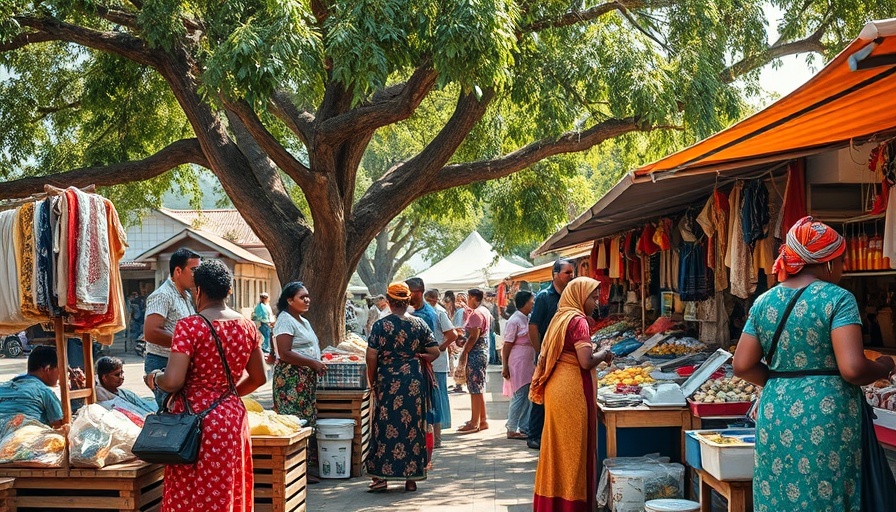
The Empowering Impact of Vocational Training in Unity State
In a remarkable initiative amidst economic challenges, Ghanaian peacekeepers have launched a vocational training workshop aimed at empowering women in Unity State, South Sudan. The program, designed to equip these women with essential skills for generating income, addresses the pressing need for economic independence and empowerment in a region often beset by instability and gender inequality.
In 'Ghanaian peacekeepers empower women in unity state through vocational training', the discussion dives into the vital role of vocational education in enhancing women’s independence, leading us to further explore its implications for gender equality and community development.
Building Skills: From Bead Making to Business
During the sessions, participants learned the intricate craft of bead making, a trade that holds the potential for their economic upliftment. As one of the participants shared, "It is new to us, and we are excited to learn something that can help us earn a living." This hands-on approach not only teaches a valuable skill but fosters a sense of community and resilience among the women, enabling them to generate income through selling their crafts in local markets.
A Pathway to Gender Equality
This program serves a dual purpose, aligning with broader efforts to improve gender equality in South Sudan, where women often face systemic barriers in accessing income-generating activities and participating in political and peace processes. By actively engaging women in vocational training, peacekeepers are not just teaching skills; they are fostering a climate of economic independence and political agency. This initiative is crucial, considering that women's involvement in such processes is often overlooked. Their empowerment is a step towards a more inclusive society, allowing them to voice their needs and contribute to community development.
Economic Independence: A Community Development Catalyst
Empowering women economically has far-reaching implications for community development. As these women learn to create their businesses, they will contribute positively to their local economies. This financial independence enhances their quality of life, and by extension, supports their families and local communities. In a context where humanitarian support is severely stretched, fostering self-reliance is not just beneficial—it is essential.
Comprehensive Support from Ghanaian Peacekeepers
The role of Ghanaian peacekeepers extends beyond training; it embodies a holistic approach to community support. Alongside vocational workshops, they have also contributed significantly to local agriculture, providing veterinary care to livestock owners. This dual approach has resulted in the treatment of over 27,000 cattle, sheep, and goats—evidence of the peacekeepers' commitment to enhancing food security and the livelihoods of communities.
Statistics and Current Trends on Women Empowerment Initiatives
The statistics regarding women’s participation in the economy globally highlight a glaring need for targeted interventions. According to recent data, improving women's economic participation could lead to significant increases in GDP across countries. Initiatives like the Ghanaian peacekeepers’ vocational training workshops exemplify how localized solutions can address larger systemic issues.
Counterarguments: Challenges in Implementation
While the initiatives are commendable, some experts argue that without a solid infrastructure for distribution and marketing, the success of such training programs may remain limited. Additionally, ongoing security concerns in regions like South Sudan pose challenges that could hinder long-term economic independence for these women. Balancing immediate needs with sustainable solutions is paramount for deeper systemic change.
Looking Ahead: Future Predictions on Economic Initiatives in Africa
The trends among international peacekeeping forces indicate a growing recognition of the role of gender equality in achieving sustainable peace. As more countries look to address economic disparities, initiatives that invest in women's skills and education will likely proliferate, leading to potentially transformative shifts in societal structures across Africa.
Conclusion: Towards Sustained Empowerment
The vocational training workshop by Ghanaian peacekeepers is more than just an economic boost; it is a movement towards gender equality and holistic community development. By prioritizing the empowerment of women, these initiatives breath hope into communities crippled by years of conflict and economic crisis. Professionals engaged in policy making and international relations should prioritize support for such initiatives as pathways to lasting stability and prosperity throughout Africa.
As the world looks toward Africa for solutions to its pressing challenges, let us reflect on the crucial role of women in shaping resilient societies. The empowerment of women is not merely a benefit but a necessity for development.
 Add Row
Add Row  Add
Add 




Write A Comment